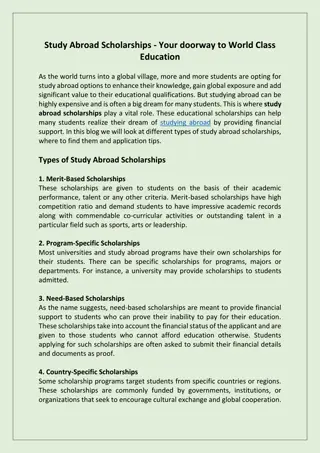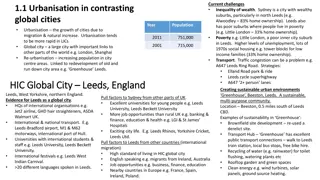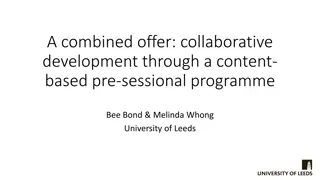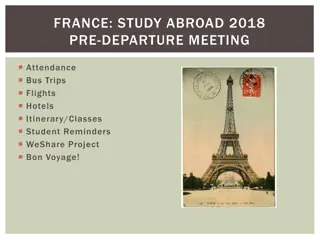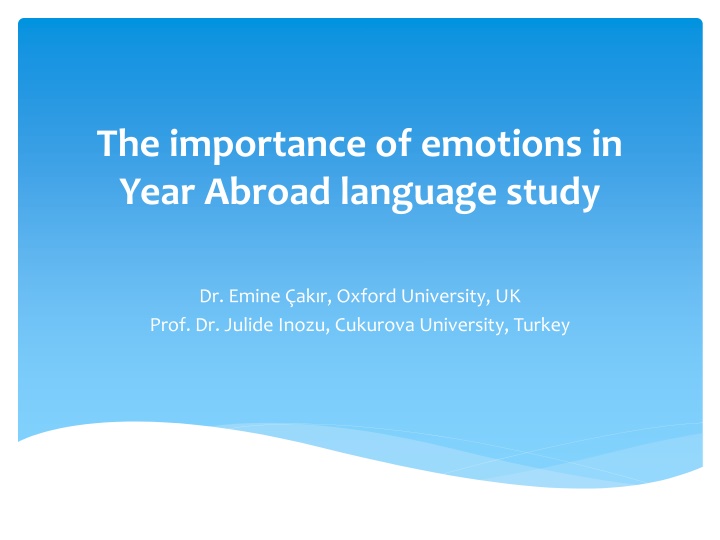
The Role of Emotions in Language Study Abroad
Explore the impact of emotions on language learning during a year abroad through a qualitative study involving tertiary students. Analyzing emotional responses and experiences, the research sheds light on how emotions influence language acquisition and self-perception in foreign contexts.
Download Presentation

Please find below an Image/Link to download the presentation.
The content on the website is provided AS IS for your information and personal use only. It may not be sold, licensed, or shared on other websites without obtaining consent from the author. If you encounter any issues during the download, it is possible that the publisher has removed the file from their server.
You are allowed to download the files provided on this website for personal or commercial use, subject to the condition that they are used lawfully. All files are the property of their respective owners.
The content on the website is provided AS IS for your information and personal use only. It may not be sold, licensed, or shared on other websites without obtaining consent from the author.
E N D
Presentation Transcript
The importance of emotions in Year Abroad language study Dr. Emine ak r, Oxford University, UK Prof. Dr. Julide Inozu, Cukurova University, Turkey
Aim This presentation explores the issue of how students make sense of their emotional experiences while studying languages abroad.
Scope It is well established in literature that emotions influence language learning. However, the reverse relationship, that language learning may influence emotions, is rarely considered (Swain, 2013). So, it is this reverse relation that we will be talking about in this presentation. The research available focuses primarily on emotions experienced within the classroom, rather than in the daily lives of learners within various social contexts (Ross and Rivers, 2018). So, we will focus our attention on emotions experienced by our participants in their social context.
Participants Five tertiary level students from the University of Oxford, Faculty of Oriental Studies
Context Following an intensive 1 year course in the target language, the participants spend the next year abroad (in our study, the students spent a year in a higher education institution in Turkey)
Data collection instruments The data consists of the learners emotional histories, which focus on the emotional responses of these learners to the language learning process in the host country. We designed our research as qualitative study. Thus, we used the personal narratives of the learners, semi-structured autobiographical interviews and whatsapp/skype interviews as our data sources. The interviews were conducted in accordance with guiding research questions as listed below: What experiences do the participants encounter with in their year abroad study in the host country? How do the participants describe these experiences and the resulting emotions? How do these emerged emotions affect their relationship and orientation to the target language? How do the participants view themselves as a target language user over time in different contexts?
Data analysis The collected data (narratives and transcripts) were content analyzed and the emerging themes were noted down. Then, considering their topics, the themes were grouped into two categories: 1. Themes referring to the emotions about how learners appraise their experiences in their foreign language learning trajectories 2. Themes referring to the outcomes of the emotional experiences that shape learners interpretations of their current selves and imagined selves as language learners We also examined how the participants expressed their emotions. The insights occurred from this aspect of the data made the impact of the emotions visible for us.
Findings 1. Learners appraisal of their subjective emotional experiences of language learning histories The most dominant negative emotions identified by the participants are: Frustration Disappointment Boredom Daunting The most dominant positive emotions identified by the participants are: Enjoyment Hope Excitement Pride
Case 1 P1 s frustration over his Turkish I felt frustrated at times by the grammar points. I felt hindered in my progress P1 s disappointment with his progress Sometimes I am wondering what I am doing here, especially as progress in Turkish isn t always concrete visible P1 s investment: joining a local football club Unlike the beginning of my time here, I am now better in grammar. It made me more excited and enthusiastic to learn and practice Turkish P1 s awareness of his avoidance in using Turkish I did hang out more with Erasmus people. I am hoping to change this. I have hopes that my dorm experience would involve a lot more chatting with mates in Turkish P1 s emotional investment: attachment I am getting more emotionally attached to Turkish
Case 2 P2 s frustration over her Turkish My spoken Turkish was very weak. So frustration on not being able to communicate at all efficiently was frustrating. Moreover, I was frustrated at myself and at the process of language learning P2 s disappointment with her progress I was boring myself and so had no interest in the study P2 s milestones in her progress I could ask for directions, or ask for a specific thing in a shop. These aided my courage to speak more frequently P2 s investment: signing up for an advanced Turkish course I took a more advanced Turkish course which was very challenging. Whenever I learnt a fresh, new piece of grammar, it became an exhilaratingexperience
Findings (cont.) 2. Learners interpretations of their current selves and imagined selves as language learners The term linguistic self-concept , relates to the individual s sense of who they are as language learners and users, and their ability to negotiate personal identities through a second language (Benson et. al., 2012, p. 184). I feel foreign insofar as I don t feel good enough to build a friendship on it. In a group of Turkish-speaking people I can t keep up with conversation Feeling like an outsider because of his lack of L2 proficiency seems to affect not only P1 s linguistic self-concept, but also his perception as a confident and communicative person P1 s positioning himself as a foreign My aim essentially is to speak less like a tourist and more like a Turkish Child Participant 2 felt unable to express herself well in Turkish and portrayed herself as infantilized by her inability in using Turkish P2 s positioning herself as a Turkish child
Findings (cont.) Linguistic self-concept does not always manifest itself in a negative way. The data showed that our participants overcome their feelings of inadequacy by developing specific coping strategies P2 s reconstruction of her identity as a language learner I am a Welsh person learning Turkish and living in Istanbul. I am definitely a foreigner in the city, but I don t see it in any other way than I see my hometown. I know the streets of Istanbul reasonably well now and I have a decent mental map of the city. So I am completely at home here. I know that I am living in Istanbul to better my language This re-formation of linguistic self-concept leads the participant to a vision of imagined future self as illustrated below I will be a Turkish-user in terms of my career in the future
Conclusion The data highlighted the importance of the notion of linguistic self-concept as described by Ellis (2004). Ellis argues that the learners emotional experiences often appeared to work in harmony with their linguistic self- concept. In line with this view, our data reveals that as learners linguistic self-concepts are developed, they are able to perceive their ability and progress within their context. Another aspect highlighted by the study was the way in which the emotional experiences of learners affected their investment in the language learning and language use.
Discussion and implications Block (2003) noted that by the end of the twentieth century, a social turn in language acquisition occurred, which greatly expanded our conceptualizations of language learning and learners. At this time, the research began to focus on learners as individuals, with intentions, agency, affect, and histories (Pavlenko & Lantolf 2000: 157). In SA, too, the conceptualizations of the language learner have changed. Coleman (2013) summarizes this shift in perspective as moving from a view of learners as homogenous processors of linguistic input to a conceptualization of the learner as a whole person . Yet, this so-called social psychological view of the language learner has been criticized on various grounds. Kinginger (2009: 156) points out that the broad array of affective and personality factors treated as causal variables are not only dynamic, but even volatile, responding to specific events and practical or emotional circumstances.
Concluding Remarks Therefore, we believe that, adding an emotional lens to interpret learners experiences abroad can help us understand why the time spent in the host country may either enhance or act as a detrimental to foreign language learning. This perspective makes a valuable contribution to our understanding of language learning abroad. Vygotsky said, Without struggle, there is no learning . Swain adds to this quote and argues that Language learning is not just a cognitive struggle, it is a cognitive and emotional struggle at the same time .
References Benson, P., Barkhuizen, G., Bodycott, P., & Brown, J. (2012). Study abroad and the development of second language identities. Applied Linguistics Review, 3(1), 173 193. Block, D. (2003). The social turn in SLA. Washington, DC: Georgetown University Press. Coleman, J. A. (2013). Research whole people and whole lives. In C. Kinginger(ed.), 17 44. Kinginger, C. (2009). Language learning and study abroad: A critical reading of research. Basingstoke: Palgrave MacMillan. Pavlenko, A. & J. P. Lantolf (2000). Second language learning as participation and the (re)construction of selves. In J. P. Lantolf (ed.), Sociocultural theory and second language learning. Oxford: Oxford University Press, 155 178. Ross, A. and Rivers, D. (2018) Emotional experiences beyond the classroom: interactions with the social world. Studies in Second Language Learning and Teaching, 8 (1), 103-126. Swain, M. (2013) The inseparability of cognition and emotion in second language Learning. Lang. Teach. (2013), 46.2, 195 207
Thank you! emine.cakir@orinst.ox.ac.uk julideinozu@gmail.com







